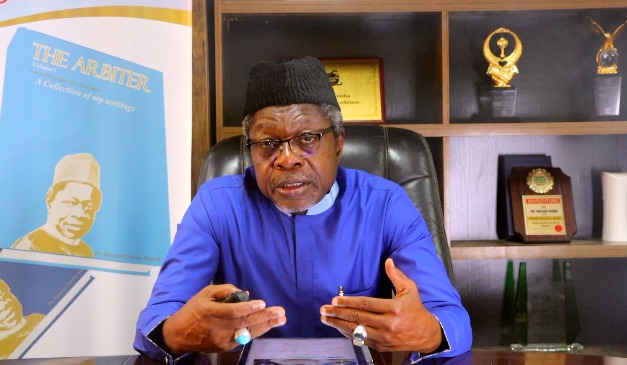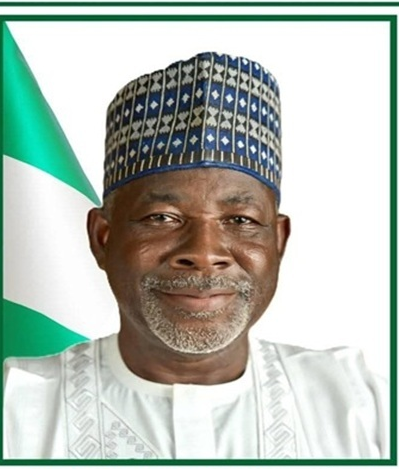On Wednesday, Justice Ambrose Lewis-Allagoa of the federal high court, Lagos, ordered federal government to fix the prices of milk, flour, salt, sugar, bicycles, motorcycles, motor vehicles, and their spare parts. This looks like a judicial attempt to address the biting inflation and the harsh economic climate caused in the main by naira devaluation. My mind instantly flashed back to 1984 when the military government of Major Gen Muhammadu Buhari announced price controls for essential commodities, also known as “essenco”. The military had overthrown the democratically elected government of President Shehu Shagari on the back of untold economic hardship and corruption.
The hardship started in 1982 but Shagari papered over the cracks obviously because a general election was approaching. Crude oil prices were falling — from an average of $34 in 1981 to $32 in 1982 and $29 in 1983. Our foreign reserves, which stood at a decent $10 billion in 1980, had crashed to just $1 billion in 1983 as oil revenue dwindled. Before the oil boom of 1973, our foreign debts totalled $420 million. With the deceit of “unlimited” oil wealth, our debts had ballooned to $14.7 billion by 1982. We earned $22.4 billion from oil exports in 1980 but just $9.6 billion in 1982. The dramatic fall ruined the economy. Still thinking we were rich, we failed to make key adjustments.
We had become hopelessly addicted to imports because of what we celebrated as a “strong currency” — even though it was clearly propelled by oil revenues which are eternally volatile and unreliable. We insisted on keeping the naira at par with the dollar. We still refer to this as the “good old days”. With companies unable to access forex for raw materials and spare parts, they started folding up or sacking workers. Civil servants were being owed salaries, some for three to four months because, simply put, government was broke. Oil wealth has a way of making you live above your means until the day breaks and you realise your tummy has expanded beyond your feeding capacity.
As Nigeria could not import enough basic stuffs like rice, sugar and milk because of forex shortage, Shagari decided to introduce “import licensing” by issuing permits to a closed group of “importers” and allocating the little dollars in the kitty to them. We set up a presidential task force to import rice to sell at “control prices”. Many of those who got forex — using their connections with Shagari’s government — were not even importers or manufacturers and did not really need the allocations. They were believed to have diverted the scarce currency to the streets, and that was apparently the origin of the street trading in dollars which we have now given the fancy name of “parallel market”.
Shagari’s government went into absolute turmoil. It tried to keep Nigeria afloat through an emergency “stabilisation plan” that cut spending, reduced imports and hiked duties. There was still no relief. As we say in Nigeria, “water don pass garri”. Prices of goods and services went through the roof. Unemployment was unforgiving as retrenchment became the order of the day. The opposition parties came hard on the ruling party, the National Party of Nigeria (NPN). This was the condition of Nigeria when then-Brigadier Sani Abacha announced the overthrow of Shagari’s government on December 31, 1983. We all celebrated the coup, expecting a better economy and lower prices.
Buhari did the “right thing” for “the masses”: he ordered price controls for essential commodities. Soldiers took over the streets, invaded warehouses, shops and markets and started dictating the prices at which goods should be sold. I recall vividly how soldiers came to our village’s central market and started forcing traders to sell goods below the prices at which they themselves bought from wholesalers. “How much is Omo?” a soldier, with a horsewhip in his hand and a rifle on his back, asked an old market woman. “Fifty kobo,” she replied. “It should be 30 kobo,” he decreed, brought out three 10 kobo coins and paid. He went on and on and on. The poor woman was distraught.
When the soldier had bought three to four items, the woman pleaded with him to move to the next stall. We were kids and bystanders and were somehow enjoying it. We believed prices were too high and thought traders and hoarders were the problem. We knew nothing about costs of production and transportation and other pricing mechanics. All we wanted was cheaper sugar, milk and Omo. How it was achieved was none of our business. My grandmother, a trader, miraculously escaped the raid by the soldiers. She later told me that what the soldiers were doing was wrong. “I cannot sell my goods for less than the cost at which I bought them. It is as I buy that I sell,” she explained to me.
Despite the highhandedness of the military enforcers, prices did not come down. In fact, things got worse as traders began to hoard the goods to avoid being forced to sell at a loss. They only sold whenever the soldiers were not around (and, in any case, how many shops and markets across the federation could they police closely?) I would later take economics in my fifth form in secondary school. We were taught that when supply is below demand, prices would rise. We were also taught that you cannot control prices if you do not have excess supply. If you are in charge of supply and you can meet demand, you can decide to lower your prices. They don’t teach this in military schools.
Now that Lewis-Allagoa has ordered federal government to fix the prices of sugar, flour, vehicles, etc, we are celebrating again. It is a pro-poor judgment, isn’t it? But we’ve been here before, haven’t we? The logic behind price control, as canvassed by its proponents, is that inflation is caused by traders and hoarders who are profiteering at the expense of the masses. There should be an element of truth to this, but that is probably 0.00001 percent of the reason for inflation. Don’t take my word for it: order a used motorcycle or spare part directly from the US and do the math. It is common sense prices will rise as component costs rise. If transportation cost goes up, the price of tomatoes will rise.
How do we enforce this judgement? We import sugar. At what point are we going to fix the price? Should we go to Brazil and order their exporters to sell to us at a particular price? Or is it when the importer has brought in the commodity — after buying dollars at N1,200 or higher — that we will order her to sell at a fixed price? Or is it at the point that the importer sells to the distributor? Or when the distributor sells to the wholesaler? Or when the wholesaler sells to Iya Mufu at Oke Arin market? I guess police will be ordered to use horsewhips to force her to sell at N50 what she bought at N100. Even locally produced goods are at the mercy of rising production and transportation costs.
Apparently, there is an outdated law called Price Control Act that was enacted by the military in 1978 during the oil boom era when petrodollars launched us into a subsidy binge, including paying for meals and laundry for university students. Those were the “good old days” of subsidising consumption instead of production. According to Mr Femi Falana, the senior lawyer and human rights activist who instituted the price control suit, a Price Control Board is saddled with the responsibility of fixing the prices of goods, preventing hoarding of goods, and protecting customers from exorbitant prices. The goods listed in the law include bicycles, matches, salt and sugar.
What better time to “fix” the prices of these all-important items than now when cost of living has gone haywire and Nigerians are in severe pains? Sure, you can keep prices below cost through subsidies. No problem. But when the bubble bursts, you will be more than sorry. Venezuela did it for a long time with petrodollars and Venezuelans thought they were on top of the world. Under President Hugo Chávez, they barely paid the market price for anything. Petrodollars subsidised all. When oil revenues crashed and funding the mammoth subsidies became impossible, the inflation did not have Part Two. Since 2015, over 7.5 million Venezuelans have gone on a “japa” spree.
The solution to our current economic woes is not artificial price controls. It will only worsen the scarcity, empower black markets and raise prices. The solution is not border closure either, as suggested by Alhaji Abubakar Kyari, the minister of agriculture and food security. He obviously learnt nothing from our previous border closure in 2020. He should please ask the National Bureau of Statistics (NBS) for data on food inflation for that year. Those who benefit the most from these knee-jerk policies are the security officers at the borders. We always avoid the hard work when it comes to policy thinking. The real challenge is: how can we reduce associated costs and boost supply?
Every economic reform must factor in safety nets for the poor. There are rational measures that can be taken in the short-run to reduce the pains. As Waziri Adio, one of Nigeria’s leading public policy analysts, proposed in his column last week, President Bola Tinubu can take urgent steps to address the food inflation by reducing tariffs on key items for a limited period of time. Releasing grain reserves can also help stabilise prices by boosting supply. This is a more sensible and realistic route to “price control” instead of using horsewhips and guns. If Iya Mufu buys a bag of flour at N40,000, how on earth can government force her to sell to consumers at N35,000? I mean, who does that?
Tinubu’s directive that grain reserves be released to boost supply and, hopefully, tame food inflation is a welcome step. Let’s hope the grains would not be diverted to hoarders. This is Nigeria. While the price control judgment has to be appealed and the law eventually amended, the truth is that Nigerians are suffering and they need to breathe. I have witnessed episodes of economic hardship since I was a kid but I have never seen anything of this dimension. I know Tinubu is clinically implementing tough reforms — which, I must agree, is inevitable if we are to have an economy — but I hope it does not end up as a case of “the surgery was successful but we lost the patient”.
AND FOUR OTHER THINGS…
GO FOR GOLD!
Displaying more of grit and less of panache, the Super Eagles are one match away from winning Nigeria’s fourth Africa Cup of Nations title. I believe I am speaking on behalf of millions of Nigerians when I say we are aiming for the trophy against Côte d’Ivoire today, having painfully lost four finals before. The way Nigerians of all “tribes and tongues” have been celebrating our outings once again confirms my bias — that we really love this country. We do not hate one another. It is just that our leaders have politically mismanaged our emotions. We are united by sport, Afrobeats and Nollywood but divided by politicians. Imagine how great Nigeria would be with quality leadership. Unstoppable.
AFRODEMOCRACY AGAIN
Senegal, one of the most politically stable African countries with no history of military intervention, is on the verge of a debilitating crisis with the strange conduct of President Macky Sall, who is due to step down as president this year after serving two terms. It is very clear that he wants to handpick his successor and is afraid of a strong opposition candidate being elected. In the typical behaviour of African leaders who have no respect for the liberal principles of democracy, he had been clamping down on opposition leaders and has now postponed the election, the first time ever, to “resolve” the crisis he orchestrated. And to think this man came to power as an opposition leader! Nauseating.
RIP, KT
I lost a dear friend on Wednesday. Kayode Tijani, the sports journalist and archivist, died at 55 after a prolonged illness, dating back to the Africa Cup of Nations in Egypt in 2019. He went there whole and returned in bad shape, never to recover. KT, as we called him, was one of the most knowledgeable sports journalists in Nigeria and had an incredible trove of videos on the country’s sporting history dating back to the 1960s. He worked at a number of reputable media organisations home and abroad. He was one of the major supporters of TheCable, the online newspaper I founded 10 years ago. I pray that his family, friends and fans will be comforted at these difficult times. Devastating.
NO COMMENT
Something to celebrate: The Nigerian National Petroleum Company (NNPC) Limited says it has commenced oil production from the Akpo West field in Port Harcourt, Rivers state. This will add 14,000 barrels per day to our production. It may look small — compared to 250,000bpd from Agbami — but given the various mortgages on our future oil production, this is better than nothing. The NNPC said the new production “is in line with President Bola Tinubu’s directive”. Have you noticed that many statements from government agencies these days start with “in line with President Tinubu’s vision” or “renewed hope agenda”? Is it a standing order or the signature tune? Wonderful.





